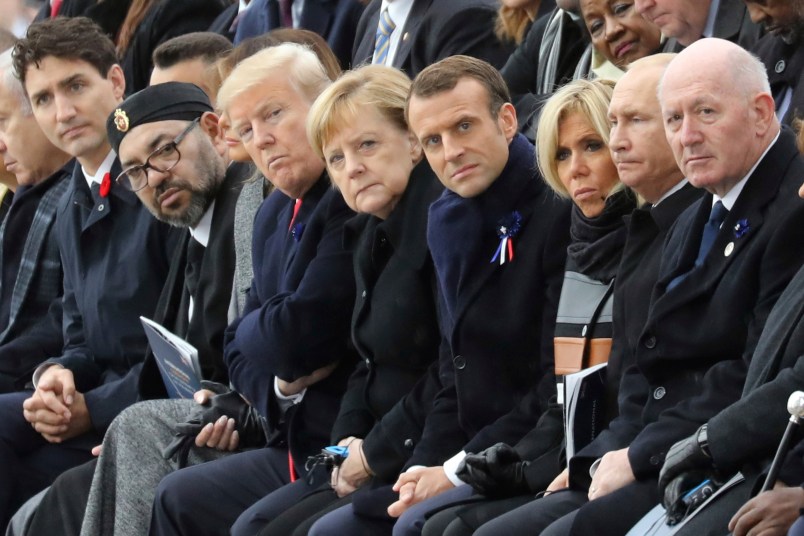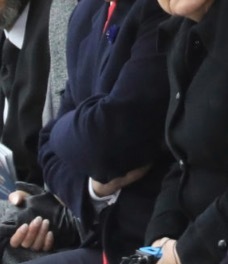PARIS (AP) — World leaders with the power to make war but a duty to preserve peace solemnly marked the end of World War I’s slaughter 100 years ago at commemorations Sunday that drove home the message “never again” but also exposed the globe’s new political fault lines.
As Donald Trump and Vladimir Putin and dozens of other heads of state and government listened in silence, French President Emmanuel Macron used the occasion, as its host, to sound a powerful and sobering warning about the fragility of peace and the dangers of nationalism and of nations that put themselves first, above the collective good.
“The old demons are rising again, ready to complete their task of chaos and of death,” Macron said.
“Patriotism is the exact opposite of nationalism. Nationalism is a betrayal of patriotism,” he said. “In saying ‘Our interests first, whatever happens to the others,’ you erase the most precious thing a nation can have, that which makes it live, that which causes it to be great and that which is most important: Its moral values.”
Trump, ostensibly the main target of Macron’s message, sat stony-faced. The American president has proudly declared himself a nationalist.
As well as spelling out the horrific costs of conflict to those with arsenals capable of waging a World War III, the ceremony also served up a joyful reminder of the intense sweetness of peace, when high school students read from letters that soldiers and civilians wrote 100 years ago when guns finally fell silent on the Western Front.
Brought alive again by people too young to have known global war themselves, the ghostly voices seemed collectively to say: Please, do not make our mistakes.
“I only hope the soldiers who died for this cause are looking down upon the world today,” American soldier Capt. Charles S. Normington wrote on Nov. 11, 1918, in one of the letters. “The whole world owes this moment of real joy to the heroes who are not here to help enjoy it.”
The Paris weather — gray and damp — seemed aptly fitting when remembering a war fought in mud and relentless horror.
The commemorations started late, overshooting the centenary of the exact moment when, 100 years earlier at 11 a.m., an eerie silence replaced the thunder of war on the front lines. Macron recalled that 1 billion shells fell on France alone from 1914-1918 .
As bells marking the armistice hour rang across Paris and in many nations ravaged by the four years of carnage, Macron and other leaders were still on their way to the centennial site at the Arc de Triomphe.
Under a sea of black umbrellas, a line of leaders led by Macron and his wife, Brigitte, marched in a stony silence on the cobbles of the Champs-Elysees, after dismounting from their buses.
Trump arrived separately, in a motorcade that drove past three topless protesters with anti-war slogans on their chests who somehow got through the rows of security and were quickly bundled away by police. The Femen group claimed responsibility. French authorities said the three women faced charges of sexual exhibitionism. White House press secretary Sarah Huckabee Sanders cited security protocols for the presidential motorcade’s solo trip down the grand flag-lined avenue, which was closed to traffic.
Last to arrive was the Russian president, Putin, who shook Trump’s hand and flashed him a thumbs-up. German Chancellor Angela Merkel was positioned in pride of place between Trump and Macron, an eloquent symbol of victors and vanquished now standing together, shoulder to shoulder. Overhead, fighter jets ripped through the sky, trailing red, white and blue smoke in homage to the French flag.
The geographical spread of the more than 60 heads of state and government who attended, silent and reflective, showed how the “war to end all wars” left few corners of the earth untouched but which, little more than two decades later, was followed so quickly and catastrophically by the even deadlier World War II.
On the other side of the globe, Australia and New Zealand held ceremonies to recall how the war killed and wounded soldiers and civilians in unprecedented numbers and in gruesome new, mechanized ways.
Those countries lost tens of thousands of soldiers far away in Europe and, most memorably in the 1915 battle of Gallipoli, in Turkey. In central London, Britain’s Queen Elizabeth II, clad in black, watched from a balcony as her son Prince Charles laid a wreath on her behalf at the foot of the Cenotaph memorial that honors the fallen. Britain had 880,000 military dead in the war.
In Paris, the jewel that Germany sought to capture in 1914 but which the Allies fought successfully to defend, the armistice commemorations were being followed by the afternoon opening of a peace forum pushed by Macron.
Trump will be the most notable absentee at the forum, where Macron’s defense of multilateralism will take center stage. Trump lives by an “America First” credo, and plans to visit the American cemetery at Suresnes on the outskirts of Paris before heading home.
On Saturday, he was criticized for canceling a visit to the Belleau Wood battleground northeast of Paris because of rain.
Remembered for brutal trench warfare and the first use of chemical weapons, the conflict pitted the armies of France, the British empire, Russia and the U.S. against a German-led coalition that included the Austro-Hungarian and Ottoman empires. Almost 10 million soldiers died, sometimes tens of thousands on a single day.
The U.S. came late to the war, in April 1917, but over 1½ years it became a key player and tipped the scales for the allies. At the war’s end, the U.S. had 2 million troops in Europe and another 2 million ready to cross the Atlantic if needed, a force that turned the United States into a major military power.
Even though Germany was at the heart of provoking two world wars over the past century, the nation has become a beacon of European and international cooperation since.
With so many leaders in Paris, the commemoration also provoked a flurry of diplomacy on the sidelines, with conflict in Yemen and Syria among the hot-button issues.
On Sunday, Merkel met with the head of the United Nations, an organization born from the ashes of World War II, and the president of Serbia. It was a Serb teenager, Gavrilo Princip, who assassinated the Austro-Hungarian crown prince in Sarajevo in 1914 to set off events which led to the outbreak of war.
___
Associated Press writers Angela Charlton, Sylvie Corbet, Elaine Ganley and Thomas Adamson contributed to this report.
___
For more information on World War I, go to The Associated Press’ WWI hub: https://www.apnews.com/WorldWarI







It’s sad that Trump is defiant to the core when he declares he’s a nationalist! Poor sick and puny mushroom
that Trump is defiant to the core when he declares he’s a nationalist! Poor sick and puny mushroom  kind of guy!
kind of guy!
Nationalists are impotent white men and sadly Trump fits so comfortably in that bed!
Sarah, Sarah why not just say it-Trump arrived by himself because no one wanted him on the bus.
Mr. Petulant Crossed Arms was in attendance.

How about under?
European leaders (other than Putin and a couple of other alt right white nationalist trash like Orban of Hungary) are waking up to the danger of Trump. America started waking up last Tuesday. Let’s all now hope Mueller lends a hand very soon and fully exposes the lawbreaking and treason of Trump and his cadre.